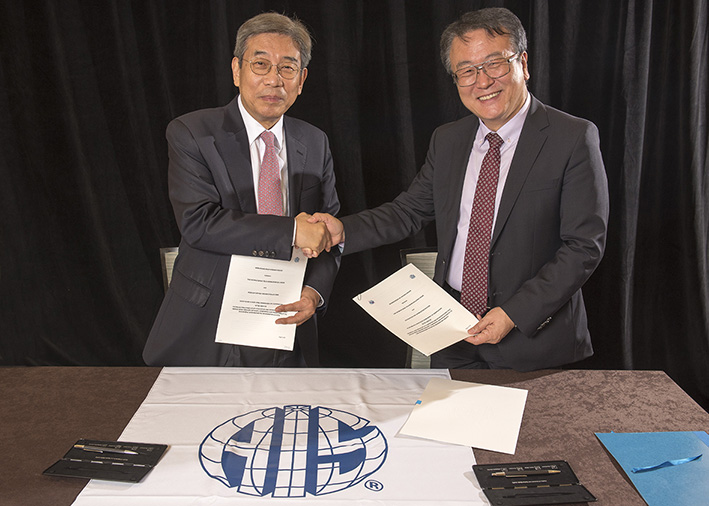people
Professor Jae-Kyu Lee (pictured on the right) from the College of Business at KAIST is one step closer to fulfilling his dream of achieving the “Bright Internet,” a campaign that he first proposed as he became the president of the Association for Information Systems (AIS) in June 2015.
On December 12, 2015, Professor Lee signed a memorandum of understanding (MOU) at a convention center in Fort Worth, Texas, between the AIS and the International Telecommunication Union (ITU)—a specialized agency of the United Nations that is responsible for issues related to information and communication technologies—on a collaborative research and development program to make the Internet safer for everyone.
The MOU pursues building a trusted international information and communication technology (ICT) infrastructure by proposing telecommunication policies, developing international standards, and organizing interdisciplinary conferences.
The Bright Internet is an initiative to protect online users from cyber terrors, privacy breaches, and cyber-crimes. Further, it involves putting accountability to those who initiate or deliver cyber threats, thereby eliminating the possible source of Internet related crimes.
Following the MOU agreement, Prof. Lee delivered a speech on his campaign at the 2015 International Conference on Information Systems and received positive responses from the audience.
The Bright Internet campaign has been selected as visions of various ICT organizations worldwide including the Korea Society of Management Information System and the International Federation of Information Processing. KAIST and Tsinghua University in China adopted it as an academic topic for research and teaching.
Prof. Lee claimed that the Internet should be used in a manner based on the values of trust, ethics, and decorum. He further noted that it is important to build Internet environments that not only protect individuals from cyber threats or attacks, but also hold those who commit online crimes accountable for their actions.

-
event A heated battle of science and sports, who is the winner of this year's KA-PO War?
< Photos from KAIST-POSTECH Science War (photographed by Student Junhyeok Park of KAIST Freshman Course) > The future leaders of science at KAIST and POSTECH (President Seong Keun Kim) held their annual science and sporting event at POSTECH for two days from September 20th to 21st. The 'KAIST-POSTECH Science War (hereafter KA-PO War)' is a festival consisting of science and sports games and various side events to promote exchange and cooperation between the two universities. It is als
2024-09-19 -
event The 3rd Global Entrepreneurship Summer School (GESS 2024) Successfully Completed in Silicon Valley
The 2024 Global Entrepreneurship Summer School (2024 KAIST GESS), hosted by the Office of Global Initiatives under the KAIST International Office (Director Man-Sung Yim), was held for the third time. This program allows students to visit Silicon Valley, a global startup hub, to directly experience its famous startup ecosystem and develop their capabilities for global expansion. A total of 20 students were selected through applications, interviews, final presentations, mentoring, and peer evaluat
2024-07-03 -
people Dr. Bong-Joon Jung Elected as Interim President of KAIST U.S. Alumni Association
On April 29th, 2024, the Office of Global Initiative at KAIST, led by Vice President Man-Sung Yim, successfully conducted the election for the interim president of the KAIST U.S. Alumni Association. The authority to organize and operate the election was delegated by the KAIST U.S. Alumni Interim President Selection Committee Foundation, consisting of Je Woo Kim, Director of KAIST U.S. Foundation; Terri Kim, Director of KAIST U.S. Foundation; and Myungjin Yim, President of the KAIST Silicon Valle
2024-04-29 -
event Center for Global Strategies and Planning Hosts Successful Virtual KAIST U.S. Alumni Connection Event
< Screen capture of the KAIST U.S. Alumni meeting held online on December 8 > On December 8th, the Center for Global Strategies and Planning at KAIST, led by Vice President Man-Sung Yim of the International Office, conducted a virtual event to bring together KAIST alumni in the United States. The purpose of this event was to showcase KAIST's current initiatives in the U.S., facilitate information exchanges among U.S. alumni, and foster networking opportunities. Over 130 KAIST alumni b
2023-12-08 -
event NYU-KAIST Global AI & Digital Governance Conference Held
< Photo 1. Opening of NYU-KAIST Global AI & Digital Governance Conference > In attendance of the Minister of Science and ICT Jong-ho Lee, NYU President Linda G. Mills, and KAIST President Kwang Hyung Lee, KAIST co-hosted the NYU-KAIST Global AI & Digital Governance Conference at the Paulson Center of New York University (NYU) in New York City, USA on September 21st, 9:30 pm. At the conference, KAIST and NYU discussed the direction and policies for ‘global AI and digit
2023-09-22